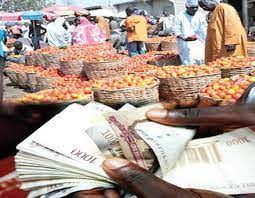The federal government Tuesday said it would establish a National Commodity Board as a solution to the escalating food inflation in the country.
Vice President Kashim Shettima said this on at a two-day high-level strategic meeting on climate change, food systems and resource mobilisation held at the Banquet Hall of the Presidential Villa in Abuja.
He said the board would be given the mandate to assess and regulate food prices as well as maintain a strategic food reserve for stabilising prices of crucial grains and other food items.
“Our solution to the potential food crisis has become immediate, medium, and long-term strategies. The short-term strategy entails revitalising food supply through specific interventions like the distribution of fertilizers and grains to farmers and households to counteract the effects of subsidy removal; fostering collaboration between the Ministry of Agriculture and the Ministry of Water Resources for efficient farmland irrigation, ensuring year-round food production; and addressing price volatility by establishing a National Commodity Board.
“This board will continually assess and regulate food prices, maintaining a strategic food reserve for stabilising prices of crucial grains and other food items,” he said.
He assured that while the Tinubu administration is fully invested in the restoration of degraded land, there were ongoing plans “to restore four million hectares, or nearly 10 million acres, of degraded lands within” the nation’s borders as its contribution to the AFR100 Initiative.
The Vice President said the federal government was handling the security challenges that have prevented farmers from working on their farms.
“I wish to assure you that we will engage our security architecture to protect the farms and the farmers so that farmers can return to the farmlands without fear of attacks.
“We won’t only make it safe for farmers to return to their farms, but we will also ensure the activation of land banks.
“There is currently 500,000 hectares of already mapped land that will be used to increase the availability of arable land for farming, which will immediately impact food output.
He said the federal administration is also collaborating “with mechanisation companies to clear more forests and make them available for farming,” stressing that the Central Bank of Nigeria “will also continue to play a major role in funding the agricultural value chain.”
“We will deploy concessionary capital to the sector, especially towards fertilizer, processing, mechanisation, seeds, chemicals, equipment, feed, labour, among others. The concessionary funds will ensure food is always available and affordable, thereby having a direct impact on Nigeria’s Human Capital Index (HCI).
“This administration is focused on ensuring the HCI numbers, which currently rank as the 3rd lowest in the world, are improved for increased productivity.
“The government will make agriculture attractive for our teeming youth population with a view to creating between 5 to 10 million more jobs for them within the agriculture value chain, working with the current 500,000 hectares of arable land and the several hundreds of thousands more farmlands to be developed in the medium term,” he said.
The Vice President said the federal government was intensifying efforts to actualize the “UN-Agenda 2030 on Sustainable Development Goals 2 of “Zero hunger” and the African Union Agenda 2063, which aims to transform Africa into a global powerhouse of the future.
“But we can’t achieve this unless we guarantee food security by building the capacity of smallholder farmers who account for about 88% of the total food production in Nigeria,” he said.
Also speaking, the National Coordinator of NEPAD, Mrs Gloria Akobundu, commended the President for his efforts towards making Nigeria a great nation.
“We are happy with the resolve by the administration of President Bola Tinubu to stand undeterred by any odds in his objective to build a viable, effective and great nation,” she said.
She said NEPAD decided to convene the stakeholders’ forum in order to strengthen small holder farmers in Nigeria as a way of addressing food shortage problem in the country.
“We have gathered key stakeholders from across Nigeria and all over the world to commence the resource mobilization conversation for smallholder farmers in Nigeria and Africa and emphasize the urgency of action required in the face of the current and growing food crisis,” she said.
Aldo speaking, the AU Chairman of Food System, Dr Ibrahim Maiyaki, said the challenges that would confront Africa in the next 20 to 30 years could be tackled through three parameters: the continent’s knowhow, expertise and leadership.
“The demographic challenge the continent is facing can be turned into opportunities for Africa through inclusion, job creation and ability to feed Africa and the rest of the world,” he said.
He called for strong regional integration through food transformation as well as boosting productivity and economic growth rates through the right policies and governance objectives.




